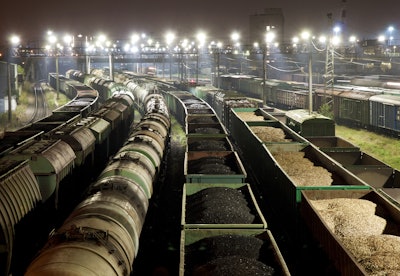
More than 45 U.S. agricultural groups sent a letter to Homeland Security Secretary Alejandro Mayorkas on December 20 requesting the immediate reopening of international rail crossings in El Paso and Eagle Pass, Texas.
The move comes after the U.S. Customs and Border Protection (CBP) closed the crossings on December 18 after it detected a surge in smuggling of migrants through Mexico by train. In a statement, CBP said the closures would be temporary but did not say when the crossings would reopen.
“The closure of the rail crossings is rippling back into the U.S. supply chain and having negative impacts on the U.S. economy,” the letter said.
The signatories, which include the American Feed Industry Association, American Soybean Association, Meat Institute, National Corn Growers Association, National Grain and Feed Association, North American Renderers Association and Pet Food Institute, said they are sympathetic to the humanitarian needs at the U.S.-Mexico border, but the closures are causing backups and hurting the U.S. economy.
“Our understanding is that it is possible for CBP to operate a rail crossing with as few as five employees, and we strongly urge you to allocate CBP staff to the international rail crossings to allow products to resume flowing,” the letter said.
Nearly two-thirds of all U.S. agricultural exports to Mexico move via rail, the groups noted in the letter. Mexico was the United States’ second largest export market in 2022 with US$28.5 billion in sales. Each day the crossings are closed, nearly 1 million bushels of grain exports are potentially lost along with export potential for many other agricultural products.
Due to the closures, rail carriers need to idle trains or reroute them in illogical ways, adding friction within the supply chain.
“We are aware of grain trains sitting at origin in at least six states that are unable to move, and we expect this number to grow,” the groups added. “We have also heard of customers in Mexico telling U.S. suppliers they will begin to look to other countries if the U.S. cannot provide a resilient and reliable supply chain.”
Blocking U.S. ag exports to Mexico creates a real threat of food inflation and increased food insecurity in that country, the groups said, adding Mexico’s livestock and poultry industry is running low on feed and Mexican livestock and poultry producers may need to depopulate animals for humanitarian reasons if these shipments continue to be blocked.
“It is hard to understand how CBP would allow this to happen to the food chain of our neighbor and one of our closest trading partners,” the letter said. “We understand there is a migrant crisis, but a supply chain and potential food security crisis in Mexico can be avoided by reopening the international crossings. We urge you to take immediate action.”















